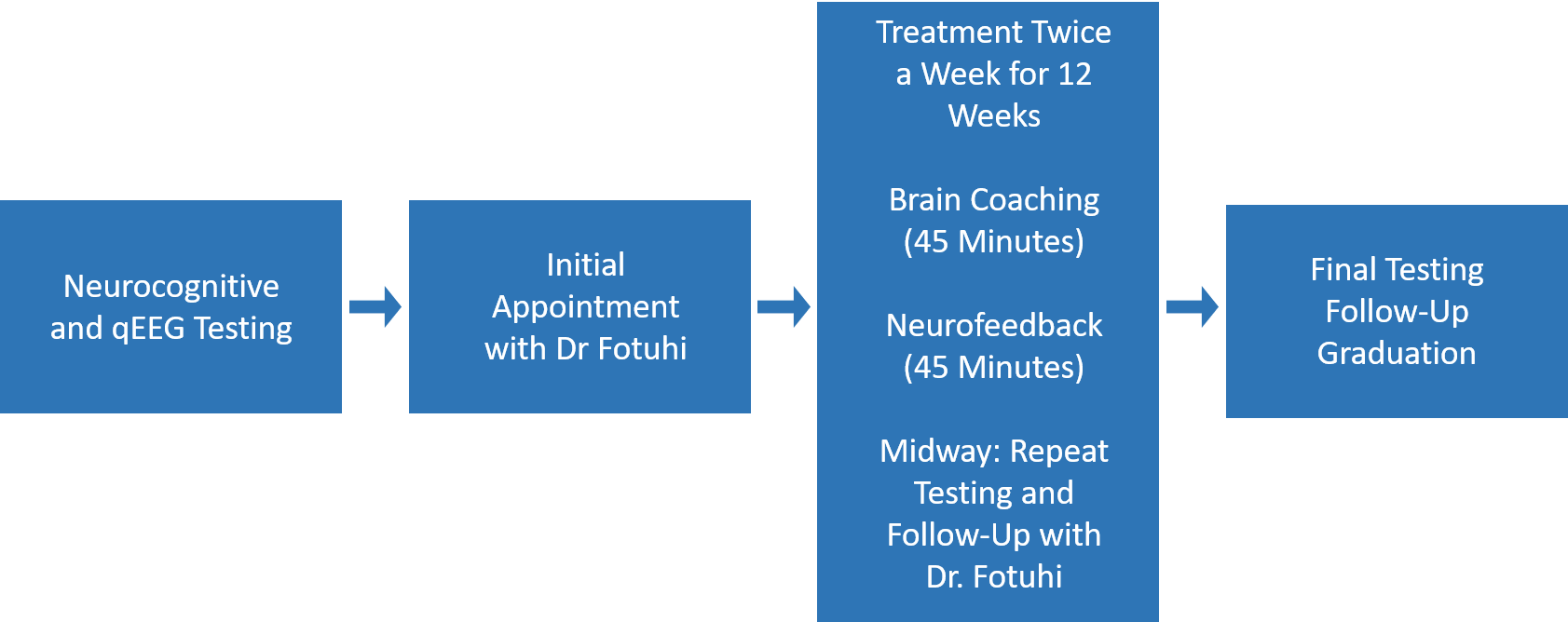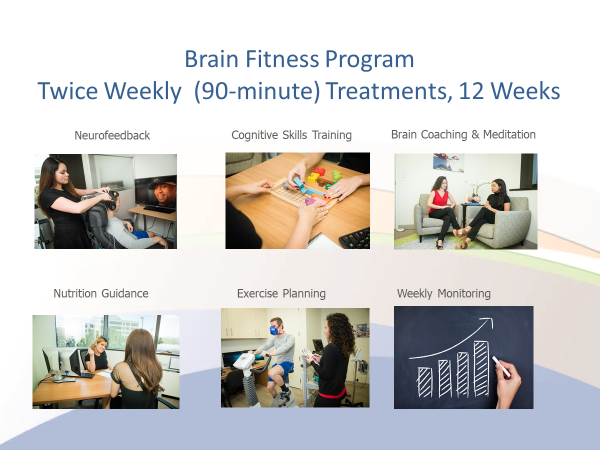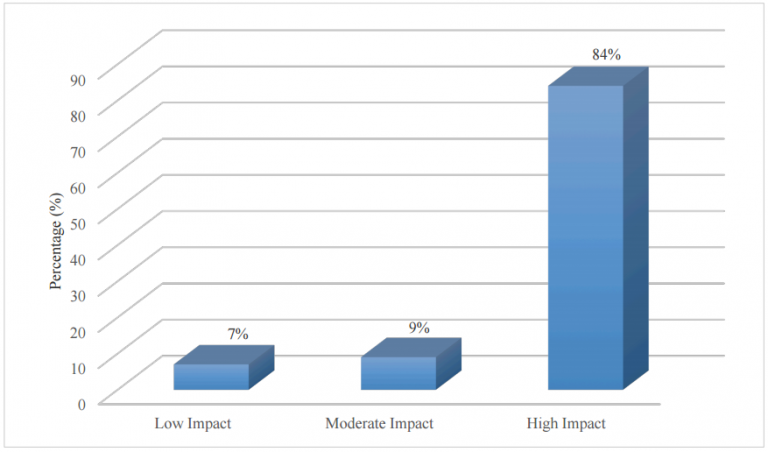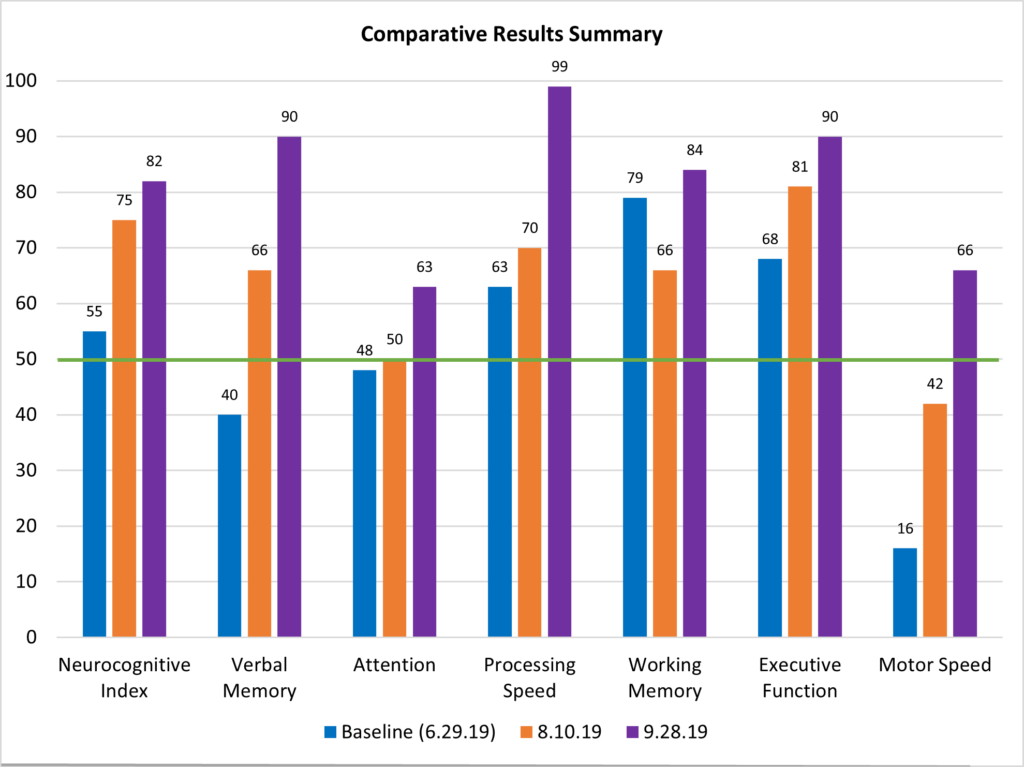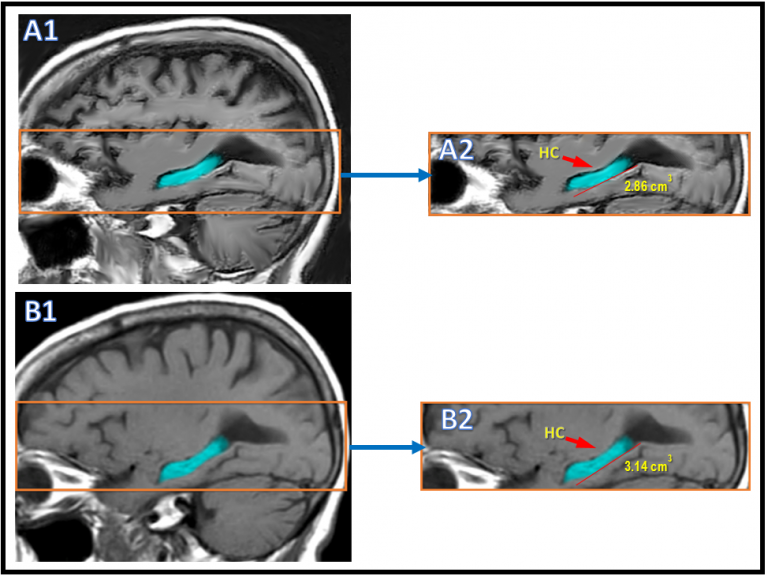Brain Portfolio
Discover Your Brain to Expand Your Mind
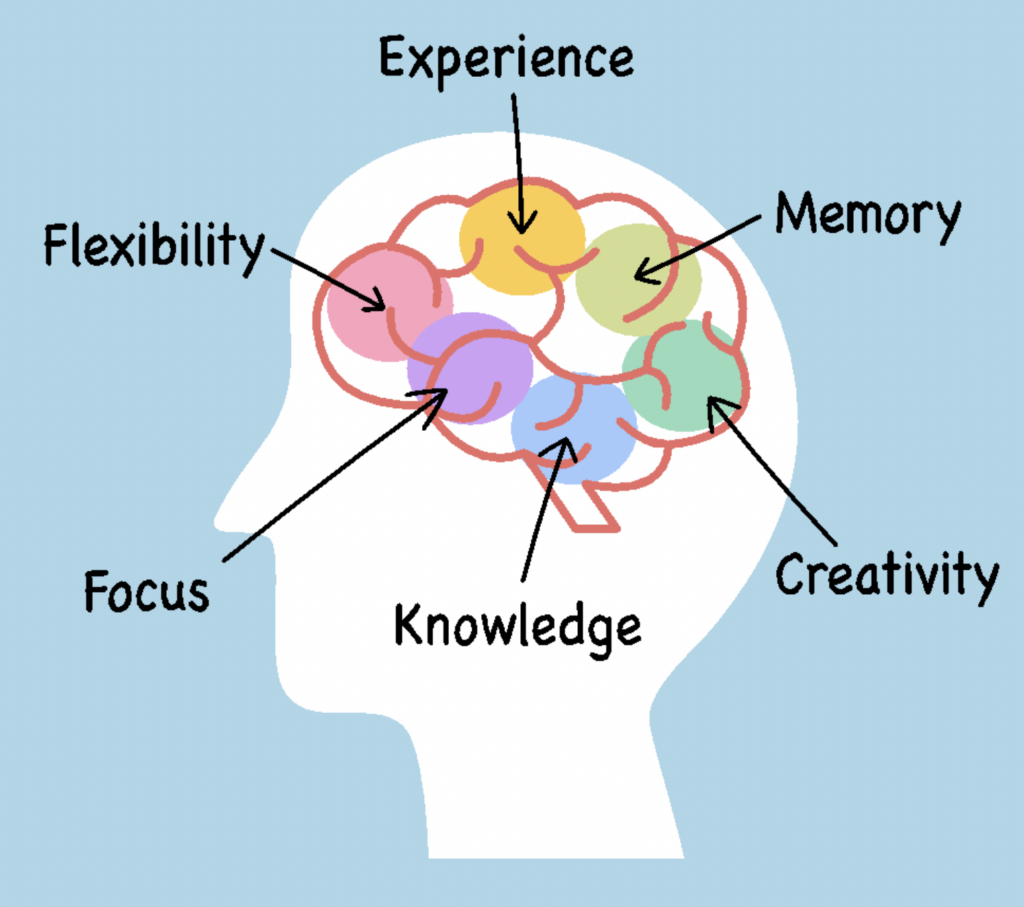
Let’s Create Your Brain Portfolio
Everyone’s brain has strengths and weaknesses. You “cognitive functions” – also known as “higher brain functions” – can include up your ability to solve problems, type fast, play the piano, sing, cook, be quick to understand what you read or write an essay, easily figure out other people’s emotions, or know when not to say anything at all. However, you may be one of those people who take for granted all the wonderful things your brain does for you effortlessly and instead complain about the fact that you forget names, can’t always keep up with the details of what goes on your work meetings, or be slow in doing your taxes. You may also not appreciate that your “cognitive imperfections” may be due to your poor sleep, excess level of anxiety, or lack of adequate amount of exercise.
In order for you to reach your peak brain performance and gain confidence in your cognitive capacity, you first need to do create an inventory of all of all the things you brain does daily and all the things that can directly or indirectly affect your brain functions. You need to create your “Brain Portfolio”.
Assessing Brain Function: Questionnaires
Brain Fitness Calculator – People’s day-to-day lifestyle choices and activities have a profound impact on their brain health and function, both in the short term and long term. The Brain Fitness Calculator is a series of questions about modifiable factors in a person’s life that can give us hints on how well they are taking care of their brains at this time and what will be the trajectory for their brain function – and size – in the future. The score from this assessment can provide incentives for people to become proactive toward building a stronger brain and appreciate how simple tweaks in their daily activities can reshape their brain for decades to come. General Symptom Questionnaire – The general symptom questionnaire is a series of questions about your symptoms on a day to day basis. The score from this assessment can provide information that our team can use to assist you in feeling sharper, calmer, and happier.Please rate the following symptoms on a scale of 1 to 10 (1 being mild symptoms; 10 being severe symptoms).
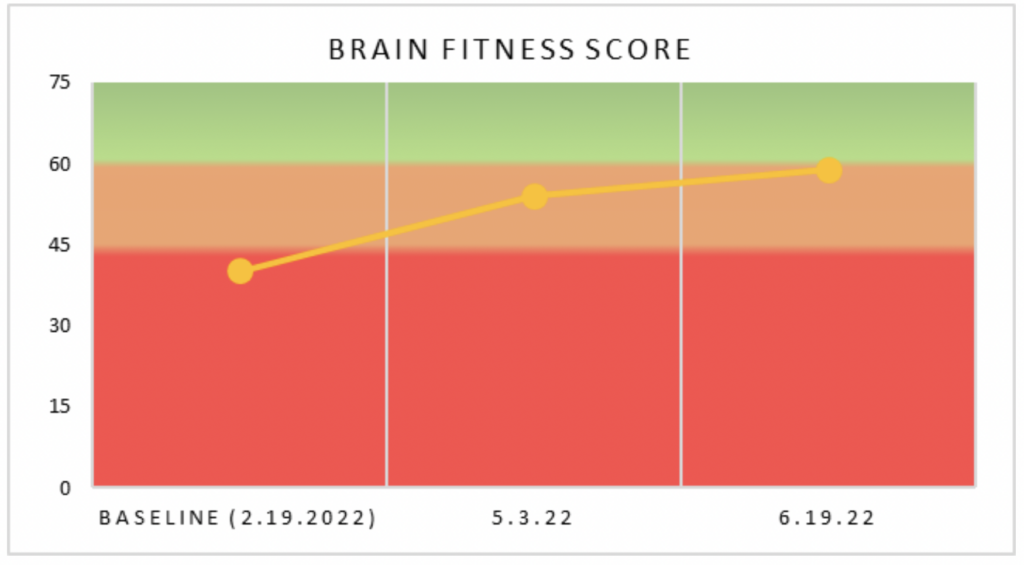
Before he started his 12-week program with Dr. Fotuhi, his responses to questions for creating his Brain Portfolio (shown with blue dots on his spidograms below) revealed he had a heavy load of cognitive and behavioral symptoms. However, as he started the program he felt his memory for names began to improve and that he had less difficulty processing information quickly (orange squares on the top spidogram). His fatigue, difficulty sleeping, and many other non-cognitive symptoms also eased when he completed his mid-program evaluation at 6 weeks (orange squares).
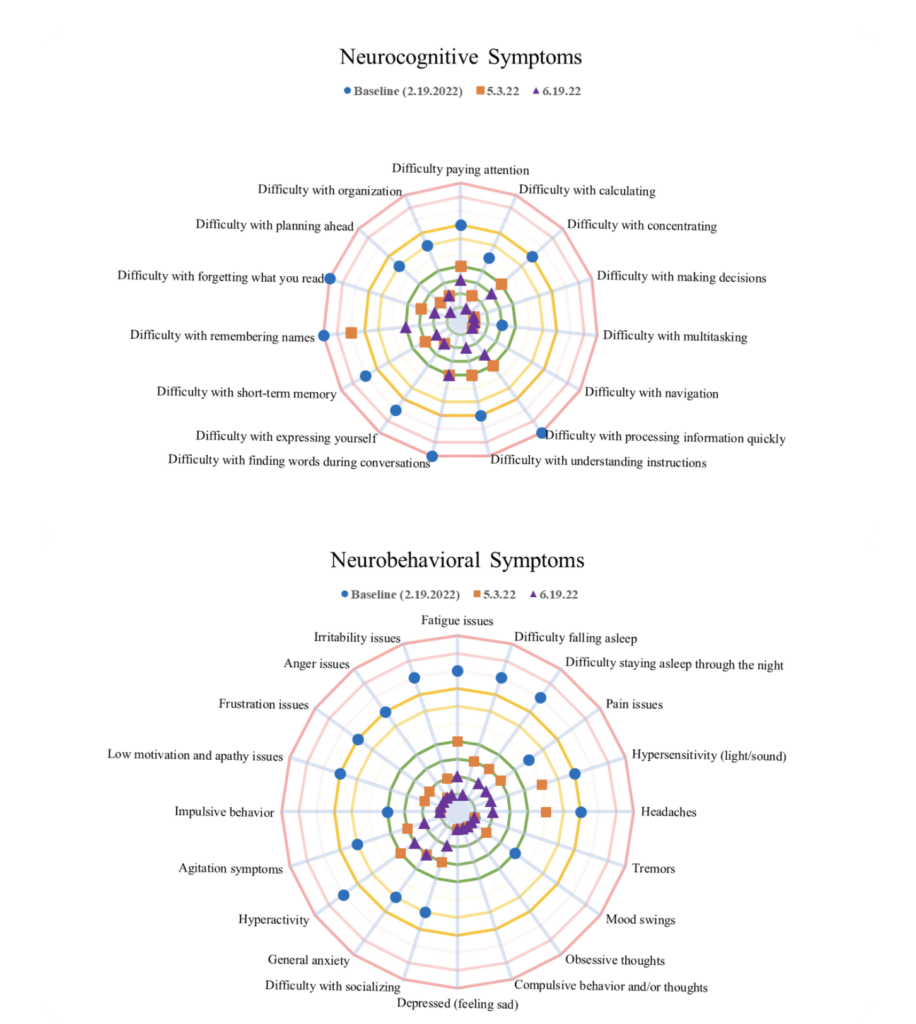
His post-program evaluation showed all his scores (shown in purple triangles) had reached the green target zone on these Brain Portfolio spidograms. He was a new person, energized with his new-found cognitive agility and the confidence he had gained in what he called his “new marvelous brain.”
Adding up all the numbers for his “neurocognitive symptoms” and “neurobehavioral symptoms” at baseline showed he had a heavy load on brain symptoms on his mind. Fortunately, this load eased significantly by mid-way in the program and was quite low by the time he completed his program.
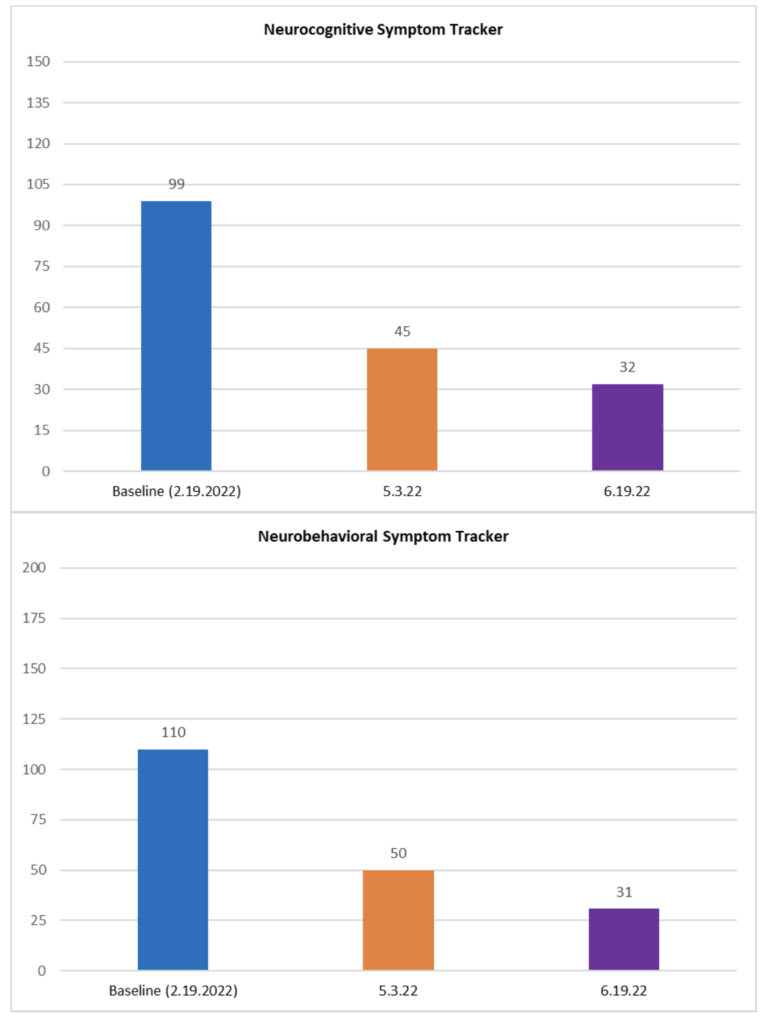
What did he receive during his 12-weeks at the NeuroGrow Brain Fitness Center? Below is a more detailed account of the interventions in this amazingly successful program.
Brain Fitness Program
The Brain Fitness Program consists of a comprehensive brain health assessment followed by a series of interventions designed to optimize memory and overall cognitive performance. Over a period of 12 weeks, patients first undergo a detailed neurological evaluation to determine all of the potential causes for cognitive deficits and brain atrophy. They then start an intensive set of treatment sessions that enhance cognitive function, reduce anxiety, improve sleep, and focus on lifestyle factors that are shown to be critical for prevention of late-life dementia.
The program has eight important interventions, starting with patient’s sense of “purpose in life” and their desire for peak brain performance in order to achieve a personal goal:
- Setting specific goals for patient’s 12-week program
- Neurofeedback training
- Encouragement to reduce stress, including exercise support
- Meditation training
- Cognitive Skills Training
- Nutrition information for Mediterranean diet and taking omega-3 supplements
- Medical treatment of insomnia, sleep apnea, vitamin deficiency, and depression, as needed
- Emphasis on brain training home assignments (“homework”), with increasing difficulty
The Scientific Basis of our Brain Fitness Program - Dr. Fotuhi's Publications
Published in NeuroRegulation (2017), about the benefits of neurofeedback for treating anxiety and depression
Published in the Journal of Prevention of Alzheimer’s Disease (2016) , about our 12-week Brain Fitness Program
Published in Nature Reviews Neurology (2012), about how to grow the memory part of our brain
Published in Nature Reviews Neurology (2009) , about how late-life memory loss has many different treatable etiologies
Learn more the scientific basis for the different components of the brain coaching in our Brain Fitness Program.
Program Results
The manuscript with results from patients who completed the Brain Fitness Program was presented at the Alzheimer’s Association International Conference in Washington DC, on July 18th, 2015. Below are the figures from this manuscript. They show that 84% of patients experienced high-impact improvements in their cognitive function, 97% had high-impact or moderate-impact improvements in their brain wave normalization. Among those who had before-and-after brain MRIs, 65% had remarkable reversal of atrophy (12%) or actual growth (53%) in the size of their hippocampus.
Percent of patients in the Brain Fitness Program (n=127) who had statistically significant improvements in their cognitive function.
More information can be found in our 2016 study, published in the Journal of Prevention of Alzheimer’s Disease (2016) , about our 12-week Brain Fitness Program
Initial qEEG

Final qEEG

Brain mapping (Q-EEG) results in one of the patients who completed the Brain Fitness Program shows significant reduction (reduced red areas) in abnormally slow (theta) brain wave activity.
Q-EEG detects changes in a patient’s brain activity and compares it with a normative set of data. Statistically significant higher than normal or lower than normal EEG activities are shown in red or blue colors, respectively. Post-program Q-EEG (B) in this patient showed significant improvement toward normal (46%) from baseline (A), through a reduction in excessive levels of slow theta waves in her right temporal lobe.
Initial and Final Brain MRI
MRI results in one of the patients who completed the Brain Fitness Program shows significant enlargement in the size of hippocampus.
Post-program MRI with NeuroQuant showed an 8.6% growth in the volume of the hippocampus (HC). (A1): Baseline Brain MRI. (B1): Post-program Brain MRI. (A2): Higher magnification of baseline hippocampal volume. (B2): Higher magnification of the post-program hippocampal volume.
